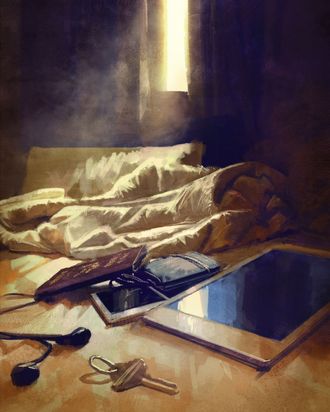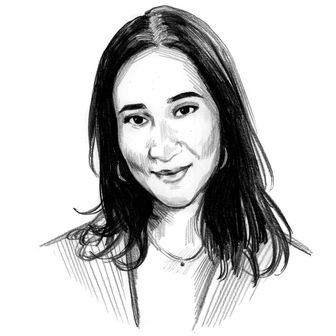
The voice I am probably most familiar with, more than my mother’s or my sister’s or my husband’s or any of my friends’, is that of the English actor Hugh Fraser, who narrates the more than 60 Agatha Christie detective novels I listened to a few summers ago. It is posh, British, and genteel, and when I am upset, it’s the sound I hear in my head.
When I am alone — unless I am working, deep in REM sleep, or reading — I am almost always listening to an audiobook. I listen while cleaning, showering, online shopping, exercising, getting acupuncture, sitting on long flights, and trying to fall asleep. I listen for hours and hours a day: at a minimum, three; at maximum, 15. My average daily listening time is around four hours on weekdays and six hours on weekends. I go through set after set of AirPods and probably listen to hundreds of books a year, but I don’t keep track because I only track things I hate, like my period. I listen less when I’m in company, but I spend a lot of time alone because I love being alone — because I have audiobooks. And with audiobooks, I feel much less lonely.
I discovered audiobooks young. I was a gloomy, serious, and unhappy child except when I was reading. And when I could get my hands on them, I found solace in “books on tape,” which came as cassettes or CDs in big plastic containers. My family had a blue-and-silver Sony stereo that was almost heavier than I was and that I would drag around with me as I listened through foam-padded headphones. I tried out other forms of escapism as a teen but returned to the habit later after realizing that I was tired of drugs and don’t even really like music (I was listening to too much Drake at the time). Technological advancements meant I could now listen to audiobooks on my phone sans boom box.
Here, specifically, is what this habit looks like: I usually have two to three books going at once. I typically read a mix of fiction and nonfiction. I consume them in various mediums — if it’s a long book, I have a paper copy, a Kindle copy, and an audio version. For listening, I have two apps: Audible and Libby. Right now, I’m listening to American Prometheus, the Robert Oppenheimer biography; The Mirror & The Light, the finale to Hilary Mantel’s Thomas Cromwell trilogy; and the version of David Copperfield that’s narrated by Richard Armitage, who really puts his back into it. (I’d also point newbies to any piece of classic literature — they’ve been around enough to get a pretty decent audio treatment; oftentimes, you can choose between a variety of narrators.)
Sometimes I talk like the audiobooks. Lately, I can’t stop saying shan’t, as in “I shan’t take the trash out. I shan’t go to bed.” I definitely didn’t get that from any real person in my life. I guess if we’re just vessels of the people closest to us, for me, at least some of these people are from my books. Unfortunately, I don’t think I’ve gotten any smarter — if anything, I’ve become more antisocial. My listening habits allow me to feel as if I’m in company without dealing with the energy-sucking problems of actually being in company, like making conversation, fake-laughing, and arguing. I can control the volume and the pace and, crucially, shut off the interaction whenever I want.
But this is the point. My husband works abroad for months at a time. He is a stabilizing force in my life, and when he leaves, there’s a period when I feel untethered from planet Earth. Instead, I become fully immersed in a fictional reality, reading, listening, and watching whatever TV or film adaptation is available. Just ask me about my favorite adaptation of Emma. Or maybe don’t, as this is, perhaps, some kind of warning sign. But alas, there are worse ways of coping. (Alas — another word I can’t stop using.)
And just like they did when I was a kid, the books help me through hard things. A few years ago, I spent some days in the hospital. I shared a room with someone very sick; the sound of her cough was like gravel shooting up and down a metal tube. Her mother sobbed all night long. I blasted Robinson Crusoe, but there are things that stories can’t drown out. The girl and her mother were still there in the morning, when I was allowed to leave. Robinson Crusoe had made it to England after 28 years. I shut off the book and listened to my mom, who had flown to New York because I was sick and was lamenting, loudly and honestly quite rudely, the hospital’s deficiencies and its incompetent doctors and how it had run out of pillows. Music to my ears.





